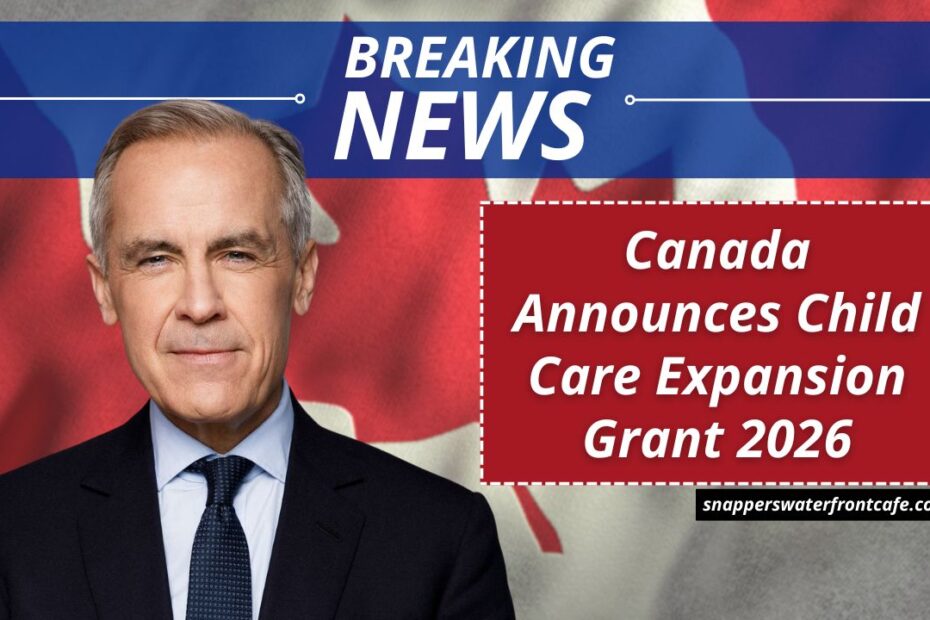The Canada Child Care Expansion Grant 2026 is a game-changing initiative by the federal government, focused on making child care more affordable and accessible for families across the country.
This latest funding phase intensifies efforts to deliver low-cost, high-quality daycare spaces while easing the financial strain on Canadian households. The program also emphasizes fair compensation for child care professionals and infrastructure growth.
Who Is Eligible for the 2026 Child Care Expansion Grant?
Eligibility for this revised grant has been broadened to ensure that resources reach those who need them most. Below are the primary groups that qualify:
- Licensed Child Care Providers: Both centers and approved home-based facilities must be licensed to qualify.
- Provincial and Territorial Governments: Local authorities will receive federal allocations and manage regional distribution.
- Parents with Young Children: Families with children aged 0–5 may qualify for direct child care subsidies, primarily based on household income.
This federal initiative complements existing provincial programs while introducing centralized federal oversight to promote transparency and efficiency.
Subsidy Structure: How Much Support Can Families Receive?
The 2026 federal budget includes significant funding increases for child care. Families can expect lower daily fees and new monthly subsidies, although the exact amount varies by province:
| Province | Average Daily Fee (After Subsidy) | Monthly Subsidy Amount | Additional Notes |
|---|---|---|---|
| Ontario | $10/day | Up to $400/month | Focus on supporting lower-income families |
| British Columbia | $10/day | Up to $350/month | Includes programs for rural families |
| Alberta | $10/day | Up to $300/month | Prioritizes creation of new daycare spaces |
| Quebec | Already subsidized | N/A | Existing structure maintained |
These enhancements are expected to reduce monthly costs by hundreds of dollars per child, allowing more parents—especially mothers—to return to the workforce.
What the Grant Funds Will Support
The 2026 grant focuses not only on affordability but also on strengthening the country’s child care system. Federal funding will support:
- New Child Care Spaces: Funding will facilitate the development of over 250,000 new daycare slots by year-end 2026.
- Educator Wages & Training: Grants will boost salaries and promote professional growth for early childhood educators.
- Inclusive Access: Funds are earmarked for programs serving children with disabilities and Indigenous communities, ensuring equal access for all.
These actions support Canada’s vision of a nationwide $10-a-day child care system.
Why This Grant Matters for Families and the Economy
The federal government recognizes child care as a core element of economic and social policy. The 2026 updates aim to:
- Strengthen child development
- Encourage greater workforce participation
- Alleviate poverty and economic barriers for parents
For instance, a two-parent household in Toronto with two children under five could save over $8,000 annually due to these grants—freeing up income and enhancing their quality of life.
The Canada Child Care Expansion Grant 2026 signifies a transformational shift in how the nation supports families. With expanded eligibility, increased funding, and a focus on inclusivity, this program is more than financial aid—it’s an investment in Canada’s children, workforce, and future. By the end of 2026, families across the country can expect a more equitable and supportive child care system.
FAQs
Can parents apply directly for the Canada Child Care Expansion Grant 2026?
Parents cannot apply for the grant directly but may benefit through lower daycare fees and monthly subsidies facilitated by licensed providers and provincial governments.
Is Quebec included in the new 2026 child care subsidy?
Quebec is excluded from the new federal subsidies due to its existing subsidized daycare system, which remains in place.
How will the grant impact early childhood educators?
The grant allocates funds to increase wages and offer training programs, improving both educator retention and care quality.



